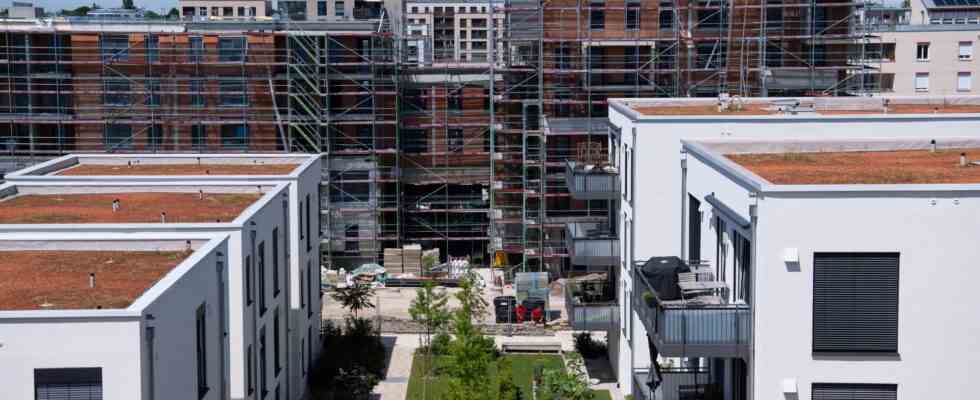Status: 03/28/2022 1:05 p.m
Building rates are rising. Despite this, real estate continues to become more expensive. Experts have been talking about overheating in the market for some time. Warnings of a real estate bubble bursting are piling up. How realistic is that?
The dream of owning your own four walls is becoming more and more unrealistic for many. Real estate prices keep going up and up. Not even the pandemic and the associated economic crisis dampened this development, but in some cases even accelerated it, especially in the outskirts of large cities. In 2021, the prices for residential real estate increased by eleven percent on average nationwide – the Federal Statistical Office even reported a record increase for the final quarter.
Real estate overvalued by up to 40 percent
According to an analysis by the Bundesbank, real estate prices in Germany are overvalued by up to 40 percent. In 2020, the overvaluation would have been a maximum of 30 percent. In its report, the leading German association of the real estate industry describes the enormous level of the purchase prices as “both surprising and quite frightening”.
And although interest rates are rising and financing is becoming more expensive, real estate prices continue to rise. The average interest rate for a ten-year building loan rose from around 1.0 percent to more than 1.6 percent.
Real estate prices are rising despite higher interest rates
One would expect real estate prices to stagnate or even fall as interest rates rise. But other economic factors stand in the way of this and cause prices to rise, according to Konstantin Kholodilin from the German Institute for Economic Research. So there is still speculation on a large scale with real estate. Houses and apartments are bought with the hope that prices will continue to rise. “In the next few years, however, there may be price corrections, especially in the big cities, meaning real estate price bubbles may burst,” says Kholodilin.
The European Central Bank and the Bundesbank also warn against speculative exaggerations in pricing, which are not just limited to urban areas, but are particularly noticeable in large cities.
Rents and purchase prices are increasingly decoupling
According to the Bundesbank, purchase prices are rising much faster than rents – a warning sign of a real estate bubble and an indication of speculation. Compared to the previous year, the prices for condominiums in the metropolises have risen by ten to 15 percent, but the rents for new contracts have only risen by 2.5 percent, according to calculations by the analysis company Bulwingesa.
But there are also understandable reasons for price increases, according to the real estate industry. Building itself has become more expensive and craftsmen are in short supply. In addition, building land is scarce and there are stricter environmental standards. These factors are expected to play a role in 2022 as well.
At the same time, the demand for real estate is still very high, also from abroad. Investors find Berlin particularly attractive because the price level here is still considered moderate compared to Paris or London and because there are no alternatives on the financial markets, they invest in real estate – despite falling returns.
prices could fall
Undoubtedly, the possibility of a price crash is increasing. Interest rates are currently rising in many regions of the world, partly because the central banks are fighting inflation. The European Central Bank is also no longer ruling out an interest rate hike this year.
This development not only makes new loans more expensive. It could also jeopardize existing loans with follow-up financing, and borrowers could thus default. As a result, banks could have problems because owners can no longer repay their loans.
Investments in the economy could thus be hampered, according to Kholodilin. In the worst case, banks would even go bankrupt. In 2007, a global financial crisis was triggered on the US real estate market.
Serious real estate crisis unlikely
Most experts consider this rather unlikely. “Legislators have learned from the past and introduced some new instruments, such as stricter lending and countercyclical capital buffers, which are intended to prevent the risk of a crash,” said Kholodilin.
In addition, it is not the price that is fundamental, but above all the risk of a loan default, and here the rules in Germany are comparatively strict. Therefore, the situation is fundamentally different from the US housing market, which has been artificially inflated by bad debt.
Investors can also absorb losses because they have made huge profits in the past and built up a capital buffer. Individuals can at least ignore short-term price declines if they have a stable income.
future uncertain
The price development can continue for years. It is not possible to predict whether and when prices will fall. In view of the increasing risk, the financial regulator BaFin has already announced stricter rules for banks. An additional buffer is to be introduced on April 1, which specifically protects residential real estate loans. While that would make the market safer, it would make new loans more expensive – making the dream of owning your own four walls even more difficult to achieve.

